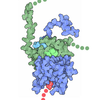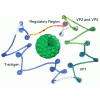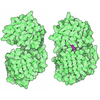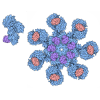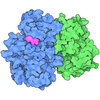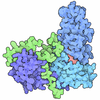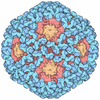[English] 日本語
 Yorodumi
Yorodumi- PDB-9gaw: High-resolution structure of the Anaphase-promoting complex/cyclo... -
+ Open data
Open data
- Basic information
Basic information
| Entry | Database: PDB / ID: 9gaw | |||||||||
|---|---|---|---|---|---|---|---|---|---|---|
| Title | High-resolution structure of the Anaphase-promoting complex/cyclosome (APC/C) bound to co-activator Cdh1 | |||||||||
 Components Components |
| |||||||||
 Keywords Keywords | CELL CYCLE / APC/C / cyclosome / Cdc20 / Cdh1 / ubiquitination / Emi1 / mitosis | |||||||||
| Function / homology |  Function and homology information Function and homology informationnegative regulation of DNA endoreduplication / positive regulation of biomineral tissue development / negative regulation of meiotic nuclear division / positive regulation of mesenchymal stem cell migration / positive regulation of anaphase-promoting complex-dependent catabolic process / negative regulation of mitotic metaphase/anaphase transition / Mitotic Metaphase/Anaphase Transition / negative regulation of ubiquitin-protein transferase activity / positive regulation of synapse maturation / regulation of meiotic nuclear division ...negative regulation of DNA endoreduplication / positive regulation of biomineral tissue development / negative regulation of meiotic nuclear division / positive regulation of mesenchymal stem cell migration / positive regulation of anaphase-promoting complex-dependent catabolic process / negative regulation of mitotic metaphase/anaphase transition / Mitotic Metaphase/Anaphase Transition / negative regulation of ubiquitin-protein transferase activity / positive regulation of synapse maturation / regulation of meiotic nuclear division / Conversion from APC/C:Cdc20 to APC/C:Cdh1 in late anaphase / regulation of mitotic cell cycle spindle assembly checkpoint / Inactivation of APC/C via direct inhibition of the APC/C complex / APC/C:Cdc20 mediated degradation of mitotic proteins / positive regulation of synaptic plasticity / anaphase-promoting complex / Phosphorylation of Emi1 / regulation of meiotic cell cycle / Aberrant regulation of mitotic exit in cancer due to RB1 defects / anaphase-promoting complex-dependent catabolic process / vesicle organization / protein branched polyubiquitination / lens fiber cell differentiation / metaphase/anaphase transition of mitotic cell cycle / Phosphorylation of the APC/C / anaphase-promoting complex binding / regulation of exit from mitosis / spindle assembly involved in female meiosis I / positive regulation of mitotic metaphase/anaphase transition / positive regulation of ubiquitin protein ligase activity / ubiquitin ligase activator activity / positive regulation of dendrite morphogenesis / protein K11-linked ubiquitination / meiotic spindle / oocyte maturation / regulation of mitotic metaphase/anaphase transition / molecular function inhibitor activity / ubiquitin-ubiquitin ligase activity / mitotic metaphase chromosome alignment / regulation of mitotic nuclear division / negative regulation of ubiquitin protein ligase activity / G1/S-Specific Transcription / mitotic G2 DNA damage checkpoint signaling / microtubule polymerization / Regulation of APC/C activators between G1/S and early anaphase / regulation of DNA replication / Transcriptional Regulation by VENTX / negative regulation of cellular senescence / cullin family protein binding / positive regulation of G2/M transition of mitotic cell cycle / enzyme-substrate adaptor activity / ubiquitin ligase inhibitor activity / positive regulation of osteoblast differentiation / positive regulation of axon extension / Cyclin A:Cdk2-associated events at S phase entry / protein K48-linked ubiquitination / ubiquitin-like ligase-substrate adaptor activity / intercellular bridge / heterochromatin / nuclear periphery / APC/C:Cdc20 mediated degradation of Cyclin B / regulation of mitotic cell cycle / APC-Cdc20 mediated degradation of Nek2A / Autodegradation of Cdh1 by Cdh1:APC/C / APC/C:Cdc20 mediated degradation of Securin / SCF-beta-TrCP mediated degradation of Emi1 / Assembly of the pre-replicative complex / Cdc20:Phospho-APC/C mediated degradation of Cyclin A / APC/C:Cdh1 mediated degradation of Cdc20 and other APC/C:Cdh1 targeted proteins in late mitosis/early G1 / G protein-coupled receptor binding / brain development / kinetochore / CDK-mediated phosphorylation and removal of Cdc6 / spindle / neuron projection development / ubiquitin-protein transferase activity / mitotic spindle / Separation of Sister Chromatids / ubiquitin protein ligase activity / nervous system development / mitotic cell cycle / Antigen processing: Ubiquitination & Proteasome degradation / microtubule cytoskeleton / Senescence-Associated Secretory Phenotype (SASP) / protein phosphatase binding / nuclear membrane / ubiquitin-dependent protein catabolic process / molecular adaptor activity / cell differentiation / protein ubiquitination / negative regulation of gene expression / cell division / DNA repair / positive regulation of cell population proliferation / DNA damage response / ubiquitin protein ligase binding / centrosome / protein kinase binding / nucleolus / zinc ion binding Similarity search - Function | |||||||||
| Biological species |  Homo sapiens (human) Homo sapiens (human) | |||||||||
| Method | ELECTRON MICROSCOPY / single particle reconstruction / cryo EM / Resolution: 2.9 Å | |||||||||
 Authors Authors | Hoefler, A. / Yu, J. / Chang, L. / Zhang, Z. / Yang, J. / Boland, A. / Barford, D. | |||||||||
| Funding support |  Switzerland, Switzerland,  United Kingdom, 2items United Kingdom, 2items
| |||||||||
 Citation Citation |  Journal: Nat Commun / Year: 2024 Journal: Nat Commun / Year: 2024Title: Cryo-EM structures of apo-APC/C and APC/C complexes provide insights into APC/C regulation. Authors: Anna Höfler / Jun Yu / Jing Yang / Ziguo Zhang / Leifu Chang / Stephen H McLaughlin / Geoffrey W Grime / Elspeth F Garman / Andreas Boland / David Barford /   Abstract: APC/C is a multi-subunit complex that functions as a master regulator of cell division. It controls progression through the cell cycle by timely marking mitotic cyclins and other cell cycle ...APC/C is a multi-subunit complex that functions as a master regulator of cell division. It controls progression through the cell cycle by timely marking mitotic cyclins and other cell cycle regulatory proteins for degradation. The APC/C itself is regulated by the sequential action of its coactivator subunits CDC20 and CDH1, post-translational modifications, and its inhibitory binding partners EMI1 and the mitotic checkpoint complex. In this study, we took advantage of developments in cryo-electron microscopy to determine the structures of human APC/C and apo-APC/C at 2.9 Å and 3.2 Å resolution, respectively, providing insights into the regulation of APC/C activity. The high-resolution maps allow the unambiguous assignment of an α-helix to the N-terminus of CDH1 (CDH1) in the APC/C ternary complex. We also identify a zinc-binding module in APC2 that confers structural stability to the complex, and we confirm the presence of zinc ions experimentally. Finally, due to the higher resolution and well defined density of these maps, we are able to build, aided by AlphaFold predictions, several intrinsically disordered regions in different APC/C subunits that likely play a role in proper APC/C assembly and regulation of its activity. | |||||||||
| History |
|
- Structure visualization
Structure visualization
| Structure viewer | Molecule:  Molmil Molmil Jmol/JSmol Jmol/JSmol |
|---|
- Downloads & links
Downloads & links
- Download
Download
| PDBx/mmCIF format |  9gaw.cif.gz 9gaw.cif.gz | 1.6 MB | Display |  PDBx/mmCIF format PDBx/mmCIF format |
|---|---|---|---|---|
| PDB format |  pdb9gaw.ent.gz pdb9gaw.ent.gz | 1.3 MB | Display |  PDB format PDB format |
| PDBx/mmJSON format |  9gaw.json.gz 9gaw.json.gz | Tree view |  PDBx/mmJSON format PDBx/mmJSON format | |
| Others |  Other downloads Other downloads |
-Validation report
| Arichive directory |  https://data.pdbj.org/pub/pdb/validation_reports/ga/9gaw https://data.pdbj.org/pub/pdb/validation_reports/ga/9gaw ftp://data.pdbj.org/pub/pdb/validation_reports/ga/9gaw ftp://data.pdbj.org/pub/pdb/validation_reports/ga/9gaw | HTTPS FTP |
|---|
-Related structure data
| Related structure data |  13931MC  19711MC  51190MC  8pkpC M: map data used to model this data C: citing same article ( |
|---|---|
| Similar structure data | Similarity search - Function & homology  F&H Search F&H Search |
- Links
Links
- Assembly
Assembly
| Deposited unit | 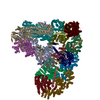
|
|---|---|
| 1 |
|
- Components
Components
-Anaphase-promoting complex subunit ... , 11 types, 13 molecules LDANIOGWMHYZC
| #1: Protein | Mass: 21282.143 Da / Num. of mol.: 1 Source method: isolated from a genetically manipulated source Source: (gene. exp.)  Homo sapiens (human) / Gene: ANAPC10, APC10 / Production host: Homo sapiens (human) / Gene: ANAPC10, APC10 / Production host:  Trichoplusia ni (cabbage looper) / References: UniProt: Q9UM13 Trichoplusia ni (cabbage looper) / References: UniProt: Q9UM13 | ||||||||
|---|---|---|---|---|---|---|---|---|---|
| #2: Protein | Mass: 14286.727 Da / Num. of mol.: 1 Source method: isolated from a genetically manipulated source Source: (gene. exp.)  Homo sapiens (human) / Gene: ANAPC15, C11orf51, HSPC020 / Production host: Homo sapiens (human) / Gene: ANAPC15, C11orf51, HSPC020 / Production host:  Trichoplusia ni (cabbage looper) / References: UniProt: P60006 Trichoplusia ni (cabbage looper) / References: UniProt: P60006 | ||||||||
| #3: Protein | Mass: 216725.469 Da / Num. of mol.: 1 Source method: isolated from a genetically manipulated source Source: (gene. exp.)  Homo sapiens (human) / Gene: ANAPC1, TSG24 / Production host: Homo sapiens (human) / Gene: ANAPC1, TSG24 / Production host:  Trichoplusia ni (cabbage looper) / References: UniProt: Q9H1A4 Trichoplusia ni (cabbage looper) / References: UniProt: Q9H1A4 | ||||||||
| #4: Protein | Mass: 93938.977 Da / Num. of mol.: 1 Source method: isolated from a genetically manipulated source Source: (gene. exp.)  Homo sapiens (human) / Gene: ANAPC2, APC2, KIAA1406 / Production host: Homo sapiens (human) / Gene: ANAPC2, APC2, KIAA1406 / Production host:  Trichoplusia ni (cabbage looper) / References: UniProt: Q9UJX6 Trichoplusia ni (cabbage looper) / References: UniProt: Q9UJX6 | ||||||||
| #5: Protein | Mass: 93014.070 Da / Num. of mol.: 1 Source method: isolated from a genetically manipulated source Source: (gene. exp.)  Homo sapiens (human) / Gene: ANAPC4, APC4 / Production host: Homo sapiens (human) / Gene: ANAPC4, APC4 / Production host:  Trichoplusia ni (cabbage looper) / Strain (production host): ANAPC4 / References: UniProt: Q9UJX5 Trichoplusia ni (cabbage looper) / Strain (production host): ANAPC4 / References: UniProt: Q9UJX5 | ||||||||
| #6: Protein | Mass: 85179.766 Da / Num. of mol.: 1 Source method: isolated from a genetically manipulated source Source: (gene. exp.)  Homo sapiens (human) / Gene: ANAPC5, APC5 / Production host: Homo sapiens (human) / Gene: ANAPC5, APC5 / Production host:  Trichoplusia ni (cabbage looper) / Strain (production host): APC4 / References: UniProt: Q9UJX4 Trichoplusia ni (cabbage looper) / Strain (production host): APC4 / References: UniProt: Q9UJX4 | ||||||||
| #9: Protein | Mass: 9793.999 Da / Num. of mol.: 2 Source method: isolated from a genetically manipulated source Source: (gene. exp.)  Homo sapiens (human) / Gene: CDC26, ANAPC12, C9orf17 / Production host: Homo sapiens (human) / Gene: CDC26, ANAPC12, C9orf17 / Production host:  Trichoplusia ni (cabbage looper) / References: UniProt: Q8NHZ8 Trichoplusia ni (cabbage looper) / References: UniProt: Q8NHZ8#10: Protein | | Mass: 8528.309 Da / Num. of mol.: 1 Source method: isolated from a genetically manipulated source Source: (gene. exp.)  Homo sapiens (human) / Gene: ANAPC13 / Production host: Homo sapiens (human) / Gene: ANAPC13 / Production host:  Trichoplusia ni (cabbage looper) / References: UniProt: Q9BS18 Trichoplusia ni (cabbage looper) / References: UniProt: Q9BS18#11: Protein | | Mass: 11677.995 Da / Num. of mol.: 1 Source method: isolated from a genetically manipulated source Source: (gene. exp.)  Homo sapiens (human) / Gene: ANAPC16, C10orf104, CENP-27 / Production host: Homo sapiens (human) / Gene: ANAPC16, C10orf104, CENP-27 / Production host:  Trichoplusia ni (cabbage looper) / References: UniProt: Q96DE5 Trichoplusia ni (cabbage looper) / References: UniProt: Q96DE5#13: Protein | Mass: 66929.367 Da / Num. of mol.: 2 Source method: isolated from a genetically manipulated source Source: (gene. exp.)  Homo sapiens (human) / Gene: ANAPC7, APC7 / Production host: Homo sapiens (human) / Gene: ANAPC7, APC7 / Production host:  Trichoplusia ni (cabbage looper) / References: UniProt: Q9UJX3 Trichoplusia ni (cabbage looper) / References: UniProt: Q9UJX3#16: Protein | | Mass: 9854.647 Da / Num. of mol.: 1 Source method: isolated from a genetically manipulated source Source: (gene. exp.)  Homo sapiens (human) / Gene: ANAPC11, HSPC214 / Production host: Homo sapiens (human) / Gene: ANAPC11, HSPC214 / Production host:  Trichoplusia ni (cabbage looper) / References: UniProt: Q9NYG5 Trichoplusia ni (cabbage looper) / References: UniProt: Q9NYG5 |
-Protein , 2 types, 2 molecules SR
| #7: Protein | Mass: 50227.488 Da / Num. of mol.: 1 Source method: isolated from a genetically manipulated source Source: (gene. exp.)  Homo sapiens (human) / Gene: FBXO5, EMI1, FBX5 / Production host: Homo sapiens (human) / Gene: FBXO5, EMI1, FBX5 / Production host:  |
|---|---|
| #15: Protein | Mass: 55253.207 Da / Num. of mol.: 1 Source method: isolated from a genetically manipulated source Source: (gene. exp.)  Homo sapiens (human) / Gene: FZR1, CDH1, FYR, FZR, KIAA1242 / Production host: Homo sapiens (human) / Gene: FZR1, CDH1, FYR, FZR, KIAA1242 / Production host:  Trichoplusia ni (cabbage looper) / References: UniProt: Q9UM11 Trichoplusia ni (cabbage looper) / References: UniProt: Q9UM11 |
-Cell division cycle protein ... , 3 types, 6 molecules KQJPUV
| #8: Protein | Mass: 71747.516 Da / Num. of mol.: 2 Source method: isolated from a genetically manipulated source Source: (gene. exp.)  Homo sapiens (human) / Gene: CDC16, ANAPC6 / Production host: Homo sapiens (human) / Gene: CDC16, ANAPC6 / Production host:  Trichoplusia ni (cabbage looper) / References: UniProt: Q13042 Trichoplusia ni (cabbage looper) / References: UniProt: Q13042#12: Protein | Mass: 91973.125 Da / Num. of mol.: 2 Source method: isolated from a genetically manipulated source Source: (gene. exp.)  Homo sapiens (human) / Gene: CDC27, ANAPC3, D0S1430E, D17S978E / Production host: Homo sapiens (human) / Gene: CDC27, ANAPC3, D0S1430E, D17S978E / Production host:  Trichoplusia ni (cabbage looper) / References: UniProt: P30260 Trichoplusia ni (cabbage looper) / References: UniProt: P30260#14: Protein | Mass: 68921.031 Da / Num. of mol.: 2 Source method: isolated from a genetically manipulated source Source: (gene. exp.)  Homo sapiens (human) / Gene: CDC23, ANAPC8 / Production host: Homo sapiens (human) / Gene: CDC23, ANAPC8 / Production host:  Trichoplusia ni (cabbage looper) / References: UniProt: Q9UJX2 Trichoplusia ni (cabbage looper) / References: UniProt: Q9UJX2 |
|---|
-Non-polymers , 1 types, 6 molecules 
| #17: Chemical | ChemComp-ZN / |
|---|
-Details
| Has ligand of interest | Y |
|---|---|
| Has protein modification | N |
-Experimental details
-Experiment
| Experiment | Method: ELECTRON MICROSCOPY |
|---|---|
| EM experiment | Aggregation state: PARTICLE / 3D reconstruction method: single particle reconstruction |
- Sample preparation
Sample preparation
| Component | Name: Anaphase-promoting complex (APC/C) bound to co-activator Cdh1 Type: COMPLEX / Entity ID: #1-#14 / Source: RECOMBINANT | ||||||||||||||||||||
|---|---|---|---|---|---|---|---|---|---|---|---|---|---|---|---|---|---|---|---|---|---|
| Molecular weight | Value: 1.2 MDa / Experimental value: NO | ||||||||||||||||||||
| Source (natural) | Organism:  Homo sapiens (human) Homo sapiens (human) | ||||||||||||||||||||
| Source (recombinant) | Organism:  Trichoplusia ni (cabbage looper) Trichoplusia ni (cabbage looper) | ||||||||||||||||||||
| Buffer solution | pH: 8 | ||||||||||||||||||||
| Buffer component |
| ||||||||||||||||||||
| Specimen | Conc.: 0.1 mg/ml / Embedding applied: NO / Shadowing applied: NO / Staining applied: NO / Vitrification applied: YES | ||||||||||||||||||||
| Specimen support | Grid material: COPPER / Grid type: Quantifoil R2/2 | ||||||||||||||||||||
| Vitrification | Instrument: FEI VITROBOT MARK III / Cryogen name: ETHANE / Humidity: 100 % / Chamber temperature: 277.15 K |
- Electron microscopy imaging
Electron microscopy imaging
| Experimental equipment |  Model: Titan Krios / Image courtesy: FEI Company |
|---|---|
| Microscopy | Model: FEI TITAN KRIOS |
| Electron gun | Electron source:  FIELD EMISSION GUN / Accelerating voltage: 300 kV / Illumination mode: FLOOD BEAM FIELD EMISSION GUN / Accelerating voltage: 300 kV / Illumination mode: FLOOD BEAM |
| Electron lens | Mode: BRIGHT FIELD / Nominal defocus max: 3500 nm / Nominal defocus min: 1500 nm / Cs: 2.7 mm / Alignment procedure: COMA FREE |
| Specimen holder | Cryogen: NITROGEN / Specimen holder model: OTHER |
| Image recording | Electron dose: 40 e/Å2 / Detector mode: COUNTING / Film or detector model: FEI FALCON III (4k x 4k) / Num. of real images: 8297 |
| Image scans | Width: 4096 / Height: 4096 |
- Processing
Processing
| EM software |
| |||||||||||||||||||||||||||||||||||||||||||||||||||||||
|---|---|---|---|---|---|---|---|---|---|---|---|---|---|---|---|---|---|---|---|---|---|---|---|---|---|---|---|---|---|---|---|---|---|---|---|---|---|---|---|---|---|---|---|---|---|---|---|---|---|---|---|---|---|---|---|---|
| CTF correction | Type: PHASE FLIPPING AND AMPLITUDE CORRECTION | |||||||||||||||||||||||||||||||||||||||||||||||||||||||
| Particle selection | Num. of particles selected: 1800000 / Details: The particles were automatically selected | |||||||||||||||||||||||||||||||||||||||||||||||||||||||
| 3D reconstruction | Resolution: 2.9 Å / Resolution method: FSC 0.143 CUT-OFF / Num. of particles: 364331 / Symmetry type: POINT | |||||||||||||||||||||||||||||||||||||||||||||||||||||||
| Atomic model building | B value: 80 / Protocol: RIGID BODY FIT / Space: REAL | |||||||||||||||||||||||||||||||||||||||||||||||||||||||
| Atomic model building | PDB-ID: 4UI9 Accession code: 4UI9 / Source name: PDB / Type: experimental model |
 Movie
Movie Controller
Controller






 PDBj
PDBj

